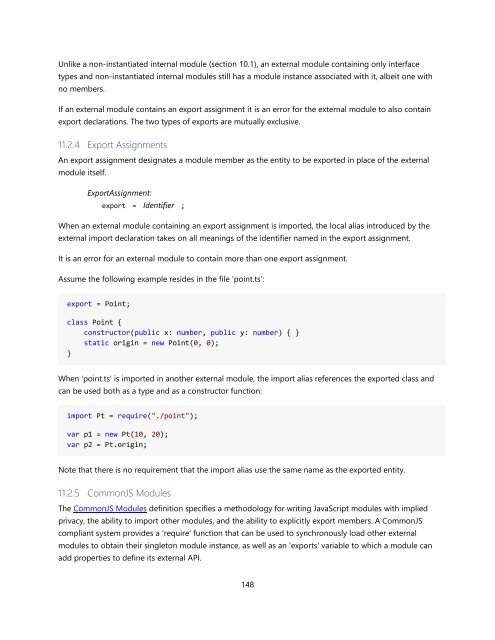TypeScript Language Specification v1.5
TypeScript Language Specification v1.5
TypeScript Language Specification v1.5
Create successful ePaper yourself
Turn your PDF publications into a flip-book with our unique Google optimized e-Paper software.
Unlike a non-instantiated internal module (section 10.1), an external module containing only interface<br />
types and non-instantiated internal modules still has a module instance associated with it, albeit one with<br />
no members.<br />
If an external module contains an export assignment it is an error for the external module to also contain<br />
export declarations. The two types of exports are mutually exclusive.<br />
11.2.4 Export Assignments<br />
An export assignment designates a module member as the entity to be exported in place of the external<br />
module itself.<br />
ExportAssignment:<br />
export = Identifier ;<br />
When an external module containing an export assignment is imported, the local alias introduced by the<br />
external import declaration takes on all meanings of the identifier named in the export assignment.<br />
It is an error for an external module to contain more than one export assignment.<br />
Assume the following example resides in the file 'point.ts':<br />
export = Point;<br />
class Point {<br />
constructor(public x: number, public y: number) { }<br />
static origin = new Point(0, 0);<br />
}<br />
When 'point.ts' is imported in another external module, the import alias references the exported class and<br />
can be used both as a type and as a constructor function:<br />
import Pt = require("./point");<br />
var p1 = new Pt(10, 20);<br />
var p2 = Pt.origin;<br />
Note that there is no requirement that the import alias use the same name as the exported entity.<br />
11.2.5 CommonJS Modules<br />
The CommonJS Modules definition specifies a methodology for writing JavaScript modules with implied<br />
privacy, the ability to import other modules, and the ability to explicitly export members. A CommonJS<br />
compliant system provides a 'require' function that can be used to synchronously load other external<br />
modules to obtain their singleton module instance, as well as an 'exports' variable to which a module can<br />
add properties to define its external API.<br />
148


















